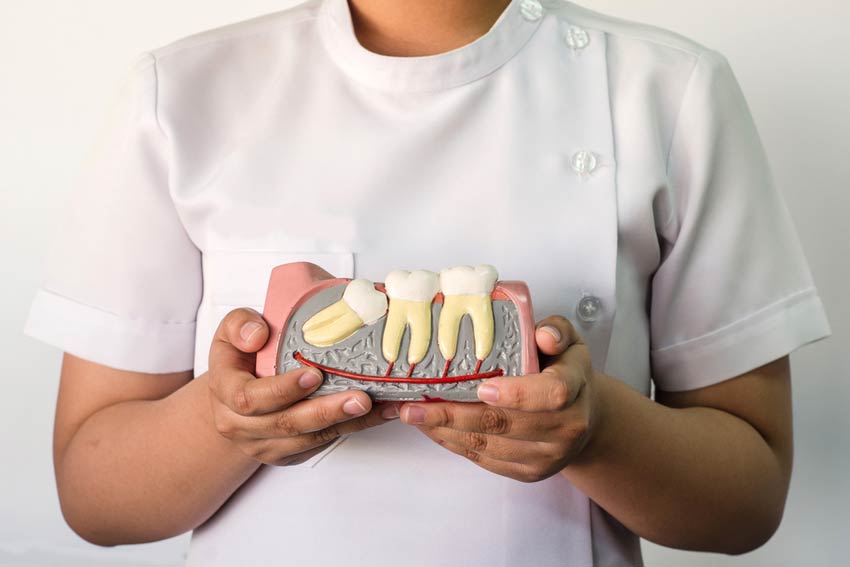
At some point in our lives, usually between the ages of 17 and 21, most adults will grow a third set of molars, which are commonly referred to as our wisdom teeth. Wisdom teeth can cause no small degree of pain, and can even affect alignment. But why do they grow and what should you do about them, even if they’re not problematic? Let’s take a closer look at the issue.
Why do we get wisdom teeth?
When we look at most teeth in the mouth, it’s easy to find their purpose. Incisors cut things when we bite down on them. Molars chew food down so we can swallow it easily. Wisdom teeth are another set of molars, but why would we need them when we already have two sets? And why are they the last teeth to emerge, waiting for all the way until early adulthood, when we already have perfectly fine working molars already?
The truth is that the everyday modern human being doesn’t really have much need for wisdom teeth, at all. In fact, it’s thought that they are vestigial remains from a past ancestor in our evolutionary chain, much like an appendix. Early humans would eat a lot of foods that are much tougher than we tend to include in our diet today, such as roots, leaves, and nuts. Since we have learned to cook our food to soften it up enough to eat, these additional molars no longer have a necessary part in our mouth.
However, despite the fact that we may not need them anymore, we humans still have genetic coding, which acts as instructions in our DNA, to grow these wisdom teeth. Over half of all adults will have wisdom teeth emerge throughout their lives, and not everyone who has wisdom teeth will see them emerge throughout their lives.
Wisdom teeth can cause a range of problems. They can be painful when they are first emerging. They can affect the alignment of our other teeth. They can become impacted, which can lead to even more problems. When this happens, removal is usually the appropriate treatment. But what about when they’re not doing any harm? Do they still need to be removed?
Do your wisdom teeth have to come out?
The question of whether or not wisdom teeth always have to be removed is one that oral health specialists have been considering seriously for years. There are plenty of cases of wisdom teeth that do not suffer any of the issues mentioned above, which may make them seem relatively safe, but the case isn’t always so simple. There is some potential that even wisdom teeth that have come through without issue can do some harm to your teeth later in life.
However, in most cases, wisdom tooth removal is only going to be recommended in the case that they are actively doing some kind of harm to your teeth. If your wisdom teeth are impacted for instance, meaning that they have not erupted from the gums properly, then they can prevent you from applying the proper oral hygiene, which can lead to decay, gum disease, and infection if not treated effectively.
Simply by the act of growing through, wisdom teeth tend to cause some pain. They are likely to be growing against your other molars, applying pressure to them as they do so. For a lot of people, this pain can be temporary and they may settle down before too long. However, wisdom teeth do not put enough pressure on teeth to push them out of alignment, as some might fear.
Wisdom teeth that have erupted without too much issue, staying straight and getting into a functional position do not have to be removed if they’re not causing any gum disease or decay issues. However, they can still be difficult to clean so removal might be recommended.
Will wisdom teeth affect your clear aligners treatment?
If you’re using clear aligners to help straighten your smile, then it’s only natural that you might be worried about what kind of impact growing wisdom teeth might have on your treatments. After all, you’re going through the process to realign your teeth and wisdom teeth can end up growing out of alignment, themselves.
However, it is important to remember that is not the case for all wisdom teeth. If they are growing straight and in a functional position, they aren’t going to be applying any pressure to the teeth that are going through the clear aligners treatment. In fact, if they’re growing properly, wisdom teeth should not affect any teeth straightening treatments in the least. Invisible aligners from ALIGNERCO should still work as effectively and help you get the bright, straight smile that you deserve regardless of whether you have a wisdom tooth erupting.
In fact, even if your wisdom teeth are growing in a misaligned way, they still won’t affect your treatment. The aligners will make sure that your teeth continue to straighten and we can even expand the treatment to help your wisdom tooth align in the right place, as well. To put it simply, while wisdom teeth might put some pressure on existing teeth, it is never enough to cause them to grow out of alignment.
Don’t forget, your doctor will be consistently checking your teeth for their progress as you’re going through the clear aligner treatment. If there are any issues, they will spot them in advance and be able to make adjustments to the treatment to ensure all goes as is planned.
Ensure the proper alignment with ALIGNERCO
If you’re ever concerned about your wisdom teeth and how they may or may not affect your alignment, be sure to talk to your doctor about them. As we have stated, wisdom teeth typically do not exert enough pressure to affect the alignment of your teeth and shouldn’t impact your treatment. However, if you’re concerned about them at all, it’s wise to talk to your doctor.


